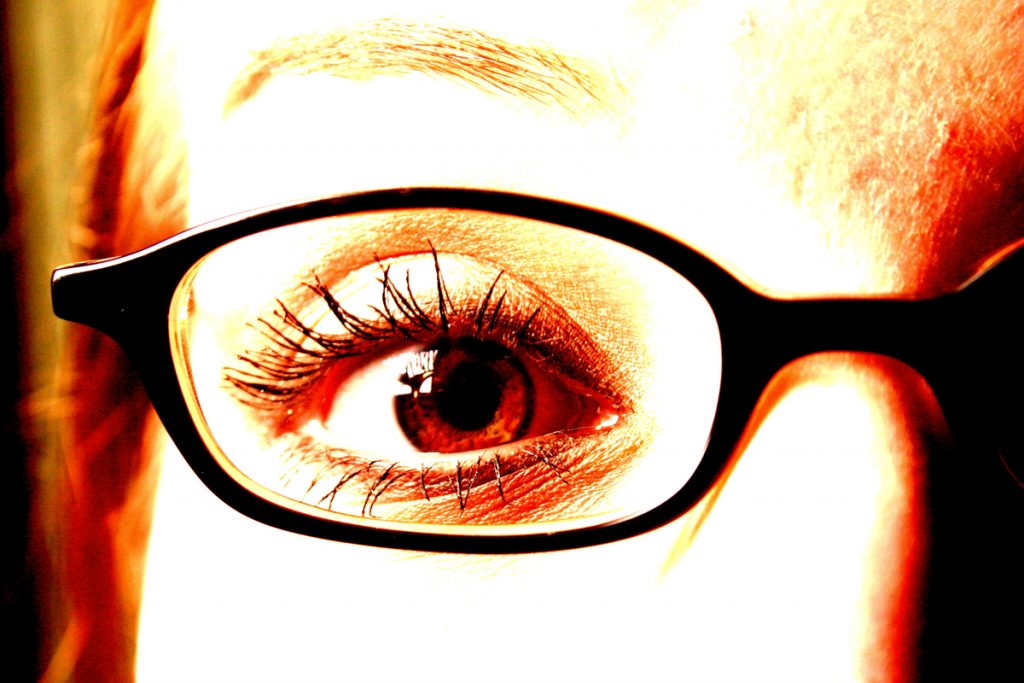Azamra: Glasses And Mirrors

Women who are eager to learn Breslov Chassidut are an amazingly honest bunch. When we learn Azamra our responses to the lesson show that we’re willing to do the hard work it takes to make this powerful teaching of Rebbe Nachman’s part of ourselves.
Whether in class or one-on-one learning, whenever we discuss Azamra, there are two main types of responses and I’ve posted versions of them, below. (These are real responses, only paraphrased):
Azamra Response Type One: Mud-colored Glasses
I don’t have a problem forgiving myself and overlooking my own faults, but I find it way too easy to see everything wrong with everyone else, including even my good friends. Their clothes, their hair or head coverings, their shoes, their personalities, their weight, their children, the way they raise their children, the things they do, the things they say, the things they believe…
I immediately think the worst of others, and always jump to conclusions. I know I’m supposed to give the benefit of the doubt, but if I’m being really honest, I just can’t seem to. My critical voice clicks on and…
I can’t say I’ve ever had a really good honest thought about anyone else—I always seem to see or remember the bad stuff they do. And if someone does something that seems good, I pick it apart until I find what’s wrong with it (even when it’s my daughter, my sister, my husband…)
I only see the good in others when I am getting my way or they are doing something for me. The minute someone doesn’t do what I like, I can’t seem to remember anything good about them. My husband can put his clothes in the hamper 364 days a year, but I only seem to remember the 1 day he forgets. My Shabbat guest can help me serve, and the one time she doesn’t, I feel resentful.
If someone from my community, especially my immediate circle, makes an error, I can be forgiving (I might have to force myself but I can do it.) But if anyone from another group does something bad, I feel they should be punished heavily for it. I’ll even bad mouth them and convince myself it’s not lashon hara.
Azamra Response Type Two: The Broken Mirror
I can’t bear to look at myself in the mirror.
I judge myself very harshly because I see what’s lacking.
I know how truly bad/petty/mean/empty/unloving/unlovable I am inside.
If I do something good, I know my real motivations aren’t so great and I’m doing it to get something (respect, praise, koved–honor, a reputation for being saintly or a martyr or more talented than others, and so on).
I know I really need to improve my speech, my thoughts, the way I dress, my modesty, my laziness, my prayers, my…but I’m so overwhelmed. I’d rather just eat something or clean or bake.
Reflections
In actuality, these two types of viewpoints are fun-house mirror reflections of each other. If we haven’t integrated Azamra, the lesson that Rebbe Nachman called a yesod gadol, a main foundation, then sometimes we primarily have a negative view of others. Or, sometimes we primarily have a negative view of ourselves. Or, we have a negative view of ourselves and others, simultaneously.
When we gaze through mud-colored glasses, we have a hard time finding the good in others and openly condemn them. Those dingy spectacles filter out the good in others, and we are only able see bad. These psychic glasses distort reality.
This is called projection.
When we project, we take our own negative feelings about ourselves and send that mass of darkness outwards so we don’t have to deal with it.
Why do we do this? The yetzer hara, the negative inclination, is very convincing. If the problem is other people, then we don’t have to work on our own stuff. We don’t have to grow spiritually or emotionally because, after all, we know we can’t change others. So, we think we might as well give up.
When we gaze into a broken mirror, we have a hard time seeing the good in, and may even openly condemn, ourselves. I’m no good. I’m all bad.
This, too, is a distortion of reality.
And, this is called depression.
When we’re depressed, we usually* believe the problem is “me” and I’m unfixable. What I’ve done I cannot undo. This is the way I am and I cannot change. I’ve done so much wrong, I’m so stuck, I might as well give up. I cannot improve.
With both projection and depression, change is not possible. Plus, our inability to focus on the good points (in others or ourselves), leads to psycho-spiritual dissonance, reality is fuzzy and painful. We become trapped in a fallacy palace, one where anxiety, despair, bitterness, and sorrow reside.
Both projection and depression are ways in which the yetzer hara cons us into believing that we are all alone, God is not with us, and we might as well just give up.
But Azamra will show us that we don’t have to give up.
In the next post, we’ll talk about the concept of Azamra and how following this practice empowers us and brings us to joy, and why joy is so important!
*Depression may also be a feeling that we are powerless to change our situation, that we are trapped. Powerlessness, however, is also a form of feeling bad about ourselves. If we are powerless, than we don’t believe anything, including our prayers, are able to effect change.